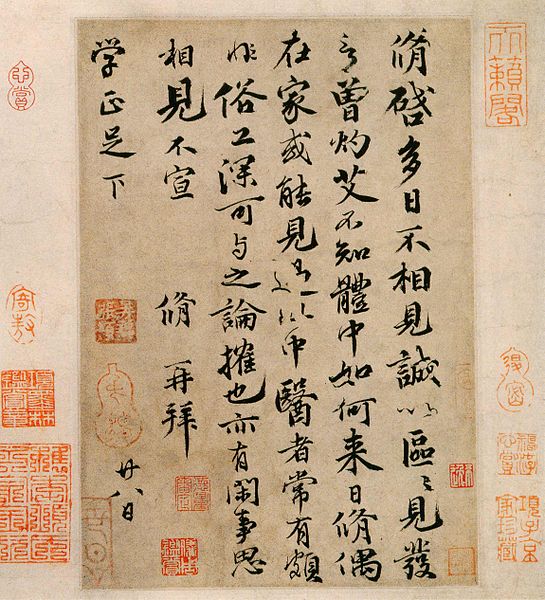Ouyang Xiu, courtesy name Yongshu, also known by his art names Zuiweng (醉翁) and Liu Yi Jushi (六一居士), was a Chinese historian, calligrapher, epigrapher, essayist, poet, and politician of the Song dynasty. He was a renowned writer among his contemporaries and is considered the central figure of the Eight Masters of the Tang and Song. He revived the Classical Prose Movement and promoted it in imperial examinations, paving the way for future masters like Su Shi and Su Zhe.
A contemporary drawing of Ouyang Xiu
Letter by Xiu
Colophon to Catalogue of Antiquities, Ouyang Xiu, 1064 – National Palace Museum read right-to-left)
The imperial examination was a civil service examination system in Imperial China administered for the purpose of selecting candidates for the state bureaucracy. The concept of choosing bureaucrats by merit rather than by birth started early in Chinese history, but using written examinations as a tool of selection started in earnest during the Sui dynasty (581–618) then into the Tang dynasty of 618–907. The system became dominant during the Song dynasty (960–1279) and lasted for almost a millennium until its abolition during the late Qing dynasty reforms in 1905. Aspects of the imperial examination still exist for entry into the civil service of contemporary China, in both the People's Republic of China and Taiwan.
Candidates gathering around the wall where the results are posted. This announcement was known as "releasing the roll" (放榜). (c. 1540, by Qiu Ying)
Examination cells, Beijing
Chinese Examination Cells at the South River School (Nanjiangxue) Nanjing (China).
A model of exam cells displayed at Beijing Imperial Academy







